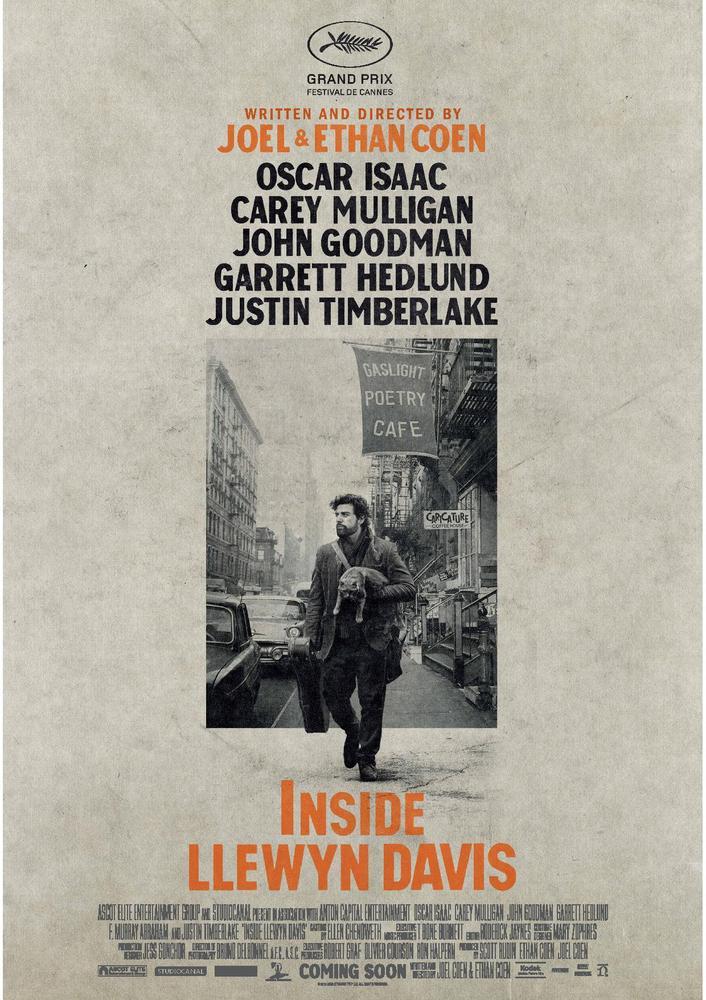
Inside Llewyn Davis feels
like a step in a different direction for the Coen Brothers, it being probably
their bleakest and most realistic character study to date. A story primarily
about the outsider artist, in which an artist fails to make it big because of
his refusal to tailor his art to the masses, it is an uneasy blend of clinical
study and warm observation.
Not entirely unlike Blue
Jasmine, Inside Llewyn Davis works as a drama of slow revelations.
The film is easier to like as it plays out, as we slowly pick up scraps of
information about Llewyn’s personality and past. He (Oscar Isaac) is a bit of a
mess, bumming around 1961 New York, sleeping on a variety of couches and
regularly making an ass out of himself. However, he performs beautifully, playing
mournful folk songs solo in the only small venue that will take him. He is
desperate to make it big but only on his own terms. Along the way, we met a
series of characters he has wronged in some way or another: his ex-girlfriend
Jean (Carey Mulligan) and her current boyfriend Jim (Justin Timberlake), the
inexplicably supportive Gorfeins (Ethan Phillips and Robin Bartlett). We also
learn more about Llewyn himself.
Initially, it is difficult to
know what to think of Inside Llewyn Davis, which moves rather
haphazardly between strange moments typical of the Coens and other scenes that
lurch uncomfortably between shrill and quiet, all focussing on characters we
don’t yet feel inclined to care about. A lot is said but little happens and
less is revealed. We are left without any context, forced to take the little
that we see at face value. Llewyn Davis is a blank slate, though we can figure
out that he’s not a nicest man in the world. Carey Mulligan overplays hatred
and is stuck with quite a lot of tin-eared dialogue – in fact, much of the
dialogue is surprisingly off-key. The film is aiming for some kind of low-key,
bleak drama but it appears overblown and wandering. There are a few scenes that
try to be funny but they fail, with or without one’s goodwill. It begins to
look as if the Coens’ may have really dropped the ball on this one. Then,
finally, the film hits a balance between the oddball comedy and the grim drama
and the characters become less annoying, more understandable. Nonetheless, the
rest of the film plays like a tug of war between the Coens’ previous work and a
new, more humane direction.
The Coens’ have made a career out
of over-the-top films, usually more comic than dramatic. Many of their best
films manage to be serious and darkly funny (Barton Fink, Fargo and
No Country For Old Men) while others veer into sheer whimsy, sometimes
successfully (Raising Arizona and The Big Lebowski), sometimes
disastrously (The Hudsucker Proxy and the two films from that mid-career
slump most fans try to forget about – Intolerable Cruelty and The
Ladykillers). Following True Grit, which aimed for drama but
collapsed into whimsy, Inside Llewyn Davis is another strange mixture
but one that is much closer to a clean break. As grim and serious as Inside
Llewyn Davis is, it remains stuck with some bizarre moments that do little
other than slow the film down, making it less relatable. The film is about the
struggle of the artist and details how artistic integrity might hold someone
back. It is ultimately a drama about disappointments and disillusionment and
yet ends on a note of defiant acceptance that is somewhat heroic and moving –
though only if you think about it, since the ending itself is somewhat bungled.
As funny as they are, the diversions, such as John Goodman’s extended cameo,
are unhelpful.
That said, there are many scenes
that do work to the overall film’s advantage. There is a brilliant scene in
which Llewyn plays a song as part of an audition, the music rousing us and
giving us hope only to plummet us back down to earth when it is finished. There
is also a very funny song ‘Please, Mr Kennedy”, written by Jim, who has clearly
sold-out. Both scenes reveal a lot about Llewyn’s character and about the final
point of the film – showing both his justifiable defiance against those who
refer to ‘music’ as an industry and the limited options that result from such a
choice. Llewyn is not a likable guy, but as an outsider and an artist, he is
brave, principled and somewhat tragic. Where the film works best are the
moments in which we are given an insight into this dilemma and, hence, this
character.
Llewyn Davis is one of the Coen Brothers’ most
realistic and human characters to date, but their showcase for him as a mixed
bag. The film works best as a character study and fails as an attempt to present
a version of 1961. The film wanders around introducing bizarre characters,
forgetting that the real meat of the film is its protagonist and what he is
going through. As funny and as moving as it sometimes is, Inside Llewyn
Davis is too unfocused and ill disciplined to be truly great.
No comments:
Post a Comment